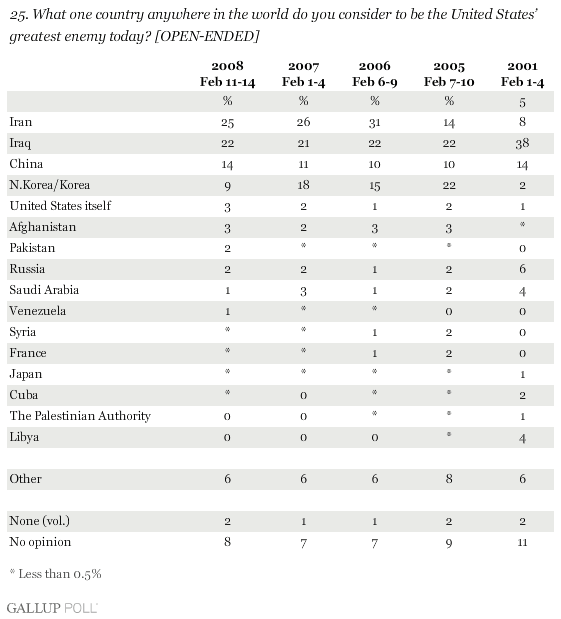PRINCETON, NJ -- With the United States and North Korea reaching some major diplomatic agreements over North Korea's nuclear program in the past year, the percentage of Americans citing that country as the United States' greatest enemy has dropped by half, from 18% in February 2007 to 9% today. Iran and Iraq continue to lead the list, while China has moved into third.
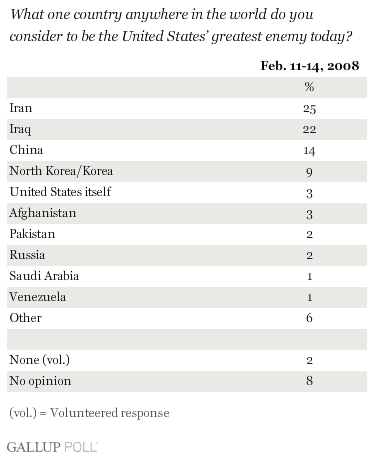
No more than 3% of Americans name any other country as the United States' top enemy. The few others mentioned by at least 1% include Afghanistan (3%), Pakistan (2%), Russia (2%), Saudi Arabia (1%), and Venezuela (1%). An additional 3% say the United States is its own greatest enemy.
Trends in Perceived Enemies
Gallup first asked this "greatest enemy" question in the pre-9/11, pre-Iraq war environment at the outset of George W. Bush's presidency in February 2001, at which time Iraq was the clear leader, followed by China and then Iran. Since then, the biggest changes have been a decline in the proportion of Americans naming Iraq, and big increases (at least through 2007) in the percentages naming Iran and North Korea.
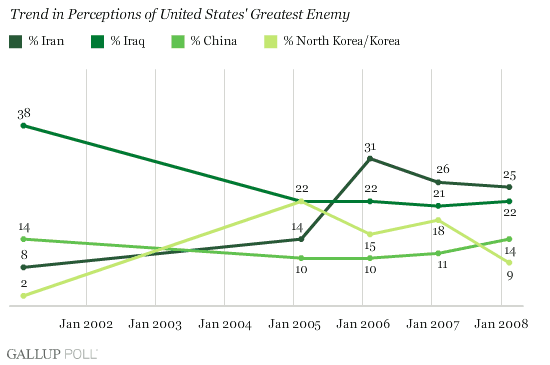
The percentage naming Iraq fell from 38% in 2001 to 22% in February 2005, and has remained at about that level in each subsequent year. No doubt the sectarian violence in Iraq and the ongoing U.S. military engagement there has kept Iraq in the top tier of countries Americans perceive as the greatest enemy, although the new Iraqi government is ostensibly an ally of the United States, supporting the U.S. military presence in Iraq.
Mentions of Iran and North Korea were only 8% and 2%, respectively, in February 2001. However, with President Bush defining both countries in his 2002 State of the Union address as part of an "axis of evil, arming to threaten the peace of the world," more Americans have given each country the top enemy designation. North Korea took a big jump to 22% by February 2005 while mentions of Iran expanded to 31% by February 2006.
All along, between 10% and 14% of Americans have named China, placing it either third or fourth on the list each time. It is unclear whether perceptions of China as an enemy are in the traditional political and military framework, or in economic terms. The same poll finds more Americans naming China rather than the United States as the world's leading economic power, so there is certainly the potential that some Americans view China's economic strength as a hostile threat.
In line with President Bush's current foreign policy worldview, Republicans are most likely to name Iran as the United States' top enemy (39%) -- more than twice the percentage among Democrats (16%). Democrats are more likely than Republicans to mention Iraq (27% vs. 16%), while differences are not as pronounced in mentions of China and North Korea.
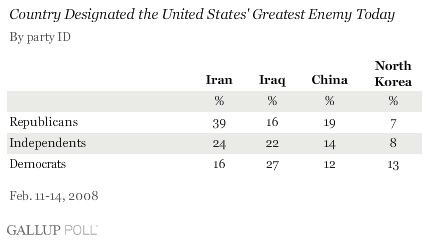
Identification of Iraq as the United States' top enemy today -- arguably a misperception held over from attitudes formed during the regime of Saddam Hussein -- is strongly associated with Americans' age and the related factor of self-reported attention to world affairs. Older Americans, and, correspondingly, those who closely follow news about foreign countries, are much less likely to designate Iraq as the United States' top enemy than are younger adults and those who are less attentive to international news.
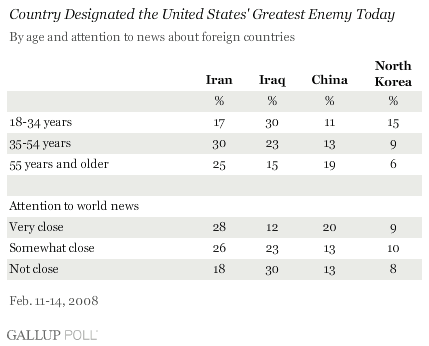
Survey Methods
Results are based on telephone interviews with 1,007 national adults, aged 18 and older, conducted Feb. 11-14, 2008. For results based on the total sample of national adults, one can say with 95% confidence that the maximum margin of sampling error is ±3 percentage points.
Interviews are conducted with respondents on land-line telephones (for respondents with a land-line telephone) and cellular phones (for respondents who are cell-phone only).
In addition to sampling error, question wording and practical difficulties in conducting surveys can introduce error or bias into the findings of public opinion polls.
